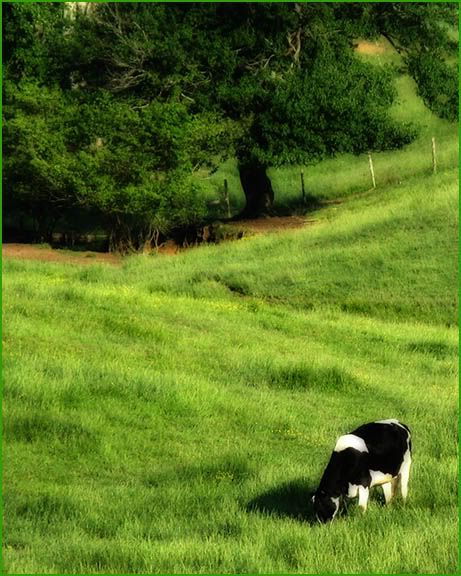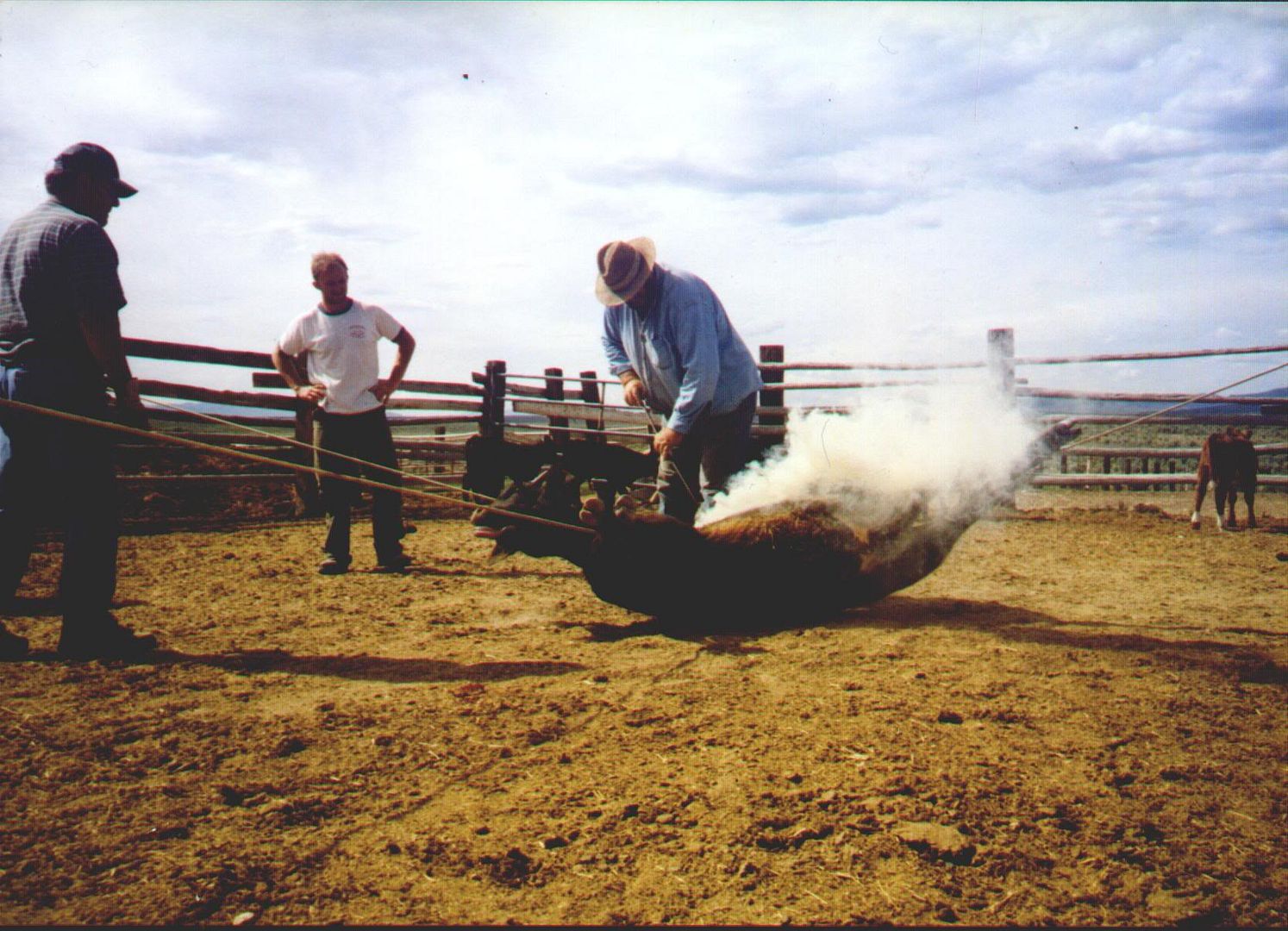
[1] The pasture is an endless sea of green paradise. It is my home; my world. The lake has been my source of life and play pen. The refreshing water brings life to the pasture. The soft dirt under my hooves is relaxing. The quiet breeze across my hide is soothing. Birds fly freely above. This life is wonderful. I can roam the pasture as long as I please, eat all the grass I can, and be with my family. Not a branding iron or electric prod in sight. I live at peace here. In my world I feel no pain. I don’t hurt. I am never lonely. I am never sad. I feel loved here. The man calls me Bessie. He never yells at me, never pushes me, never shocks me, and never hurts me. He is unlike many others. The man shows he cares for me. My life seems wonderful until I wake up from this beautiful dream into my horrible reality.
All I can see is a never-ending sea of cows like me. There is no room to roam free. No space to lie down. My source of water is disgusting. The man here never bothers to clean it for my sake at least. I walk in my own feces, along with everyone else’s that is confined in this small pen. If for some miracle there is an opportunity for me to walk around; it’s difficult. Treading in ankle deep feces is degrading. If the man only knew how atrocious this feels, to be covered in my own waste, he would provide a

pasture for us. Wouldn’t he? The horrendous stench in the air causes my nose and eyes to burn. I’m exhausted. Recently, I’ve heard talk that we are going to be killed. The man wouldn’t do that to us after our suffering here in the pen. Or would he? Could he really be this cruel? I wanted to find out for myself to end this curious anxiety. I tried asking other [2] cows, but no one wants to tell me. They all say the same thing. “Does it matter anyways? It will end this tragic life.” I tried asking the man, but all he does is beat me or shock me when I try talking to him. Why is the man evil? After getting nowhere in trying to find out the truth, I feel hopeless. It’s not fair. What gives him the right to kill us? We’ve done nothing wrong. Did I do something to deserve this? Have I angered him? I’ll do anything to make it up for him. I promise I won’t disappoint him anymore. After a couple of days I started to notice the cows in other pens never came back after the man had taken them away. The optimism I had to keep me going was beginning to drain out of me. All this insane cruelty didn’t make sense. Why bother anymore? I’m going to die. Perhaps when I die, I can forever be in my paradise.
On a grim morning the man came with others to my pen. This is it. They opened the gate. It’s happening. The man began shouting at us. He called us worthless stupid animals. I was scared. Where was he taking us? As none of us moved, they pulled out long heavy sticks and ones they called prods. They repeatedly shocked and beat us to get moving. I screamed in pain as the man shocked me while another hit me repeatedly as I couldn’t feel. “Stop!” I yelled. Do they not understand some of us are injured already? Some of us can barely stand, let alone walk. Vicious beings they are. No compassion in their actions. Slowly, we all gradually walk out of the pen into a loud dark box. Is this where I take my last breath? No; we’re just crammed in to be as uncomfortable as ever. I don’t know how long we’re going to be here. I’m starting to worry for some of the others. I know they won’t last longer. They’re depressed, hopeless, and in despair.The loud droning noise of the dark box is a constant reminder [3] of our future death. However, it is

a reminder that I am still alive. I lose conscience now and then; hoping to wake up in my paradise. It’s pointless. I try to imagine my amazing world, but nothing. I start to wonder if we will ever leave this box. This is all a cruel game the man is pulling on all of us; it has to be. He enjoys this and wants to see us suffer more. His hate for us is so extreme; he has to push our sanity off the edge. With each passing moment I get more depressed. Will this ever end? I somehow managed to look around me, and I see it—death. Several others had passed out on the floor. I stared at their stiff lifeless bodies wondering how I will die. The sight of my own kind dead on the floor, rotting, makes me sad. Would I die soon? I start to hear the man’s voice again. The loud droning ceases. The door is opened. Relief sets in, but only for a few seconds.
The sun casted rays of scorching light into our eyes. I felt disorientated and fatigued. The ache in my stomach and the intense thirst made me believe I was half insane already. Again, the violent beings would hit and shock us to get off the box. We walked into a huge building. It was dreary, and I had a feeling this would be our last stop. Besides what other ghastly things could they possibly do to us now? This place was new. I hated it. The smell of this new place was awful. I could hear a dull roar coming from the inside. Everyone looked so miserable. We were placed in lines. Then I come back to my senses and my stomach is in knots. The dull roar is clearer now; I could hear the other cows and their blood-curdling screams. Their cries for help were being ignored. I had never heard of cows pleading for their lives so desperately. What could possibly be going on inside to make them shriek like this? A pressure rises in my chest; I can feel my heart race. I have to get out, but how?
Paralyzed by the chaos, I didn’t notice I was being tied by my foot with a chain. Another man is there looking down on me with what looks like a medium slim stick. I look into his eyes, hoping he can at least see my terror and read my cry of help. No sign of sign of mercy. His gaze is cold and blank. It’s as if he has not even there. Not even aware that he is injuring beings. I start to panic. My heart is about to come out of my chest. I see blood on the walls. I try kicking, no use. I try jumping, even worse. Anything I try to do to escape I hurt myself. I feel so helpless. Why can’t I just escape to my paradise right now? Just then, the chain drags me into the air. I’m petrified. I cry. This new place was covered in blood and cows screaming. I desperately wanted to leave, but no hope. I’m in an awkward position, nothing makes sense. Everything that’s down is up. The man approaches me with the slim dagger glistening in the little light there is. He waves it over my neck.
Please! Don’t do it!
[4]

My iris grew in bewilderment as the dark figure approaches my panting heart. The silver dagger is warm with someone else’s blood. Something so elegant, yet so barbaric makes a single cut. A dark red pool of my life poured out at the beast’s whim. The excruciating pain is enough to make me wish I was dead already. Blood gushes out of my neck onto the walls, floor, and his clothes. I gasp for life; I choke. This can’t be. Why must I die this way? I feel him rummaging through my throat and ripping out parts of my body. He’s ruthless. I try begging him to stop, but it’s futile. I am no longer in front of him. I am on the floor bleeding to my death; on the floor bleeding out of my neck, mouth, and nose. I am on the floor struggling to hold onto my life. The pain is unbearable. I can slowly feel my body is starting to let go of life. Everything is becoming dark. I try opening my eyes; but I give up. I’m ready to go to my paradise. I want to stop hurting. I want to stop feeling terrified. I want to feel loved. I want to live.
I found myself in my paradise not too long after the savage act of violence. It feels different, though. Perhaps it’s because I get to stay here and not wake up. I don’t complain at all here. There is no pain, no brutal beasts, and no spine-chilling screams. Fresh blue skies, sweet air, and the infinite sea of green pasture are all I see now. I am at peace.
[5]

Word Count: 1,544
[1]http://img.photobucket.com/albums/v250/visualpurple/VisualVitamins/LushWithCow.jpg
[2]http://i735.photobucket.com/albums/ww355/cottonsocks08/MEAT%20-%20COWS/Feedlots.jpg
[3]http://i91.photobucket.com/albums/k313/Stoat_2006/cows.jpg
[4] http://www.alv.org.au/issues/cattle/slaughteredcow.jpg
[5] http://i14.photobucket.com/albums/a345/vero_h/field-1024x768.jpg














 Slavery in America was accepted because "the ethic of human domination removed animals from the sphere of humanc concern...[which] legitimized the ill-treatment of humans who were in a supposedly animal condition." (321) The idea of speciesism was grounded into their minds which established racism. Because of our lack of respect for animals, humans were tortured and abused for many years. This racism and speciesism was brewed because of lack of empathy. During the holocaust laws were passed to segregate the Jews which "was necessary to reduce people's understanding of, and empathy for, Jewish people. This way, whatever happened to the Jews was out of the line of people's moral vision." (334)
Slavery in America was accepted because "the ethic of human domination removed animals from the sphere of humanc concern...[which] legitimized the ill-treatment of humans who were in a supposedly animal condition." (321) The idea of speciesism was grounded into their minds which established racism. Because of our lack of respect for animals, humans were tortured and abused for many years. This racism and speciesism was brewed because of lack of empathy. During the holocaust laws were passed to segregate the Jews which "was necessary to reduce people's understanding of, and empathy for, Jewish people. This way, whatever happened to the Jews was out of the line of people's moral vision." (334)